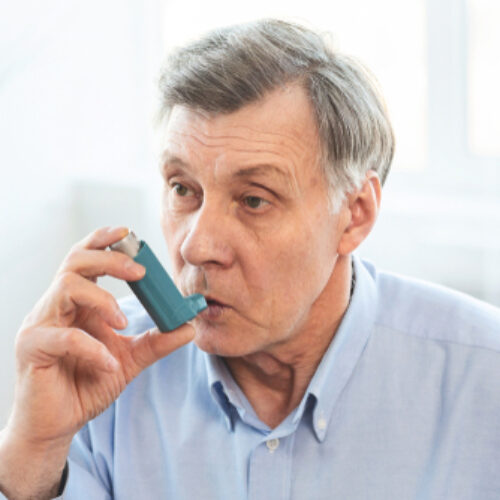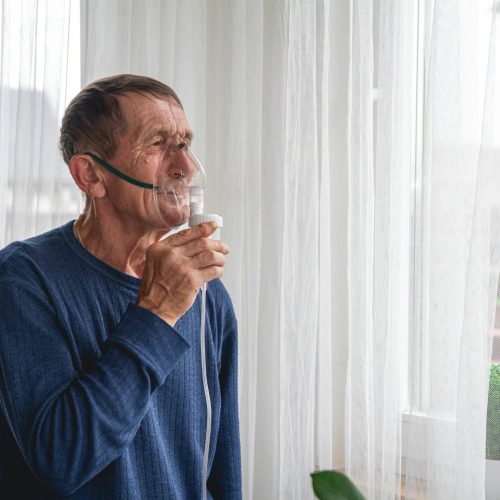Introduction to treatments.
On this page we will discuss the following topics:

Using your inhaler correctly
It’s important that you know how and when to use your inhaler or inhalers. One of the biggest challenges for people with COPD is knowing how to use their inhalers correctly, and when to use them.4
A large clinical trial that followed more than 6,000 people over a 3-year period, found that those COPD patients who stuck to their treatment plan had longer times until their first flare-up, and had fewer severe flare-ups compared to those who didn’t stick to their treatment plan.5
What if I don’t know how to use my inhaler correctly?
It’s really important that you are comfortable using your inhaler correctly. If you are unsure or have any questions, no matter how small they might be, please contact one of your medical team.
It might be useful to write down any questions or any changes you have seen before your appointment. You can use your discussion list to help you with this.
Want to discuss this topic in your next appointment?
Add this to your discussion list as a handy reminder to discuss this with your doctor, nurse or pharmacist at your next appointment.
Steroid tablets are usually prescribed to be taken for 5 days.2
This is because using steroids for a longer period of time can cause unwanted side effects, such as:2
Weight gain
Mood swings
Weak bones
(known as osteoporosis)
What if I have questions about taking steroids?
Your medical team will review you closely when you are taking steroids, so this is a great opportunity for you to ask them any questions you might have. You can also call them for a separate appointment.
It might help to use your discussion list to note your questions before your appointment.
Other medicines
You might also be prescribed other medicines occasionally.
Antibiotics
You may be prescribed antibiotics if you have signs of a bacterial chest infection, such as:3
Becoming more breathless than usual
Coughing more than usual
Having a change in colour or consistency of your mucus
Mucolytics
You may be prescribed a tablet or a syrup called a mucolytic if you cough up a lot of mucus. This makes your mucus thinner and easier to cough up.3
What if I have questions about other medicines I am taking?
If you have any questions about these or any other medicines you are taking, please contact one of your medical team. You can use your discussion list to note your questions before your appointment.
What is oxygen therapy?
The 3 main types of oxygen therapy at home are:6
Long-term oxygen therapy
which keeps your oxygen levels stable for 15 hours or more
Ambulatory oxygen therapy
(sometimes called portable oxygen), which helps you to be more active
Palliative oxygen therapy
which is used to help manage very low oxygen levels at the end of life
Once your oxygen is installed, it’s really important that you’re comfortable and happy that your oxygen treatment is working for you. If you have any questions, you can ask the people delivering your oxygen supply to your home, or you can ask one of your medical team.
When should I use my Rescue Pack?
If you think you are having a flare-up, you should follow the action plan agreed with your medical team. If you have any questions or worries during this time, it is important that you contact them for advice.
Should I let my medical team know if I have used my Rescue Pack?
You should let your medical team know as soon as you use any of the medicines in your Rescue Pack. You should also let them know if things don’t improve within 2 days of starting your Rescue Pack.1
If you need to use your Rescue Pack for more than 3 flare-ups in a year, then book a review with one of your medical team.1
You can use your helpful discussion list to prepare for your review.

In case of emergency
You should call 999 if you’re struggling to breathe or have sudden shortness of breath, and:1
Your chest feels tight or heavy
You have a pain that spreads to your arms, back, neck and jaw
You feel or are being sick
Understanding your treatment plan: what, why and how?
What is my treatment plan?
Your treatment plan (or regimen) is a course of medication and management to help treat your COPD.
By following your treatment plan, you’ll be able to reduce the symptoms of COPD, reduce how often and how severe your COPD flare-ups are, and improve your ability to exercise and your everyday health.9

Your treatment plan might include:2
- Stopping smoking: this is one of the most important things you can do
- Inhalers and medicines: these can help to make symptoms and breathing easier
- Pulmonary rehabilitation: this is a specialised programme of exercise and education
- Oxygen therapy: this delivers oxygen through tubes into your nose or through a mask
- Non-invasive ventilation: this uses a mask to cover your nose or face to make breathing easier
- Surgery or a lung transplant: this might be an option for a very small number of people
You and your medical team will decide together which medications you should use. This will depend on a range of factors, including how severe your COPD is, how it affects your everyday life, and any side effects you may have had from previous medications.3
Why should I follow my treatment plan?
It's important to take any prescribed medicine, including inhalers, as directed by your medical team, as this can help prevent bad flare-ups.9
Although it might seem scary to begin with, by managing your condition by yourself (with support from others) you’ll start to feel more in control of your COPD, as you will learn more about your condition, your symptoms, your medicines and how to cope with flare-ups. It will also make your day-to-day life easier and could reduce the risk of needing to go into hospital.10
How should I manage my treatment plan?
It’s a good idea to make sure you know the names of all your medicines, how much to take and how to take them, and share this information with anyone who might be helping you with your daily activities, such as a partner or a carer.
You can find more details on how to manage your symptoms and your medicines by using the Asthma + Lung UK COPD Self-management plan booklet, available here. This includes a handy tracker for you to note down which medicines you are taking, why you are taking them and when you take them, along with any other useful information.11
Please don’t stop taking medications unless you’re told to and remember to get repeat prescriptions in good time. Talk to your medical team if you experience any side effects from your medicines.11
What if I don’t know what to do?
If you are ever not sure about anything to do with your COPD or your treatments, you can always talk to one of your medical team, no matter how small the questions. You might find it useful to make a note of your questions before you speak to someone, using your handy discussion list.
Want to discuss this topic in your next appointment?
References
- Asthma + Lung UK. Managing COPD flare-ups. Available at: https://www.asthmaandlung.org.uk/conditions/copd-chronic-obstructive-pulmonary-disease/managing-copd-flare-ups
- NHS. Treatment. Available at: https://www.nhs.uk/conditions/chronic-obstructive-pulmonary-disease-copd/treatment/
- Asthma + Lung UK. Medications for COPD. Available at: https://www.asthmaandlung.org.uk/conditions/copd-chronic-obstructive-pulmonary-disease/medications-copd
- Jardim, JR, Nascimento, OA. The Importance of Inhaler Adherence to Prevent COPD Exacerbations. Med Sci (Basel). 2019;7:doi.org/10.3390/medsci7040054
- Vestbo, J, Anderson, JA, Calverley, PM, Celli, B, Ferguson, GT, Jenkins, C, Knobil, K, Willits, LR, Yates, JC, Jones, PW. Adherence to inhaled therapy, mortality and hospital admission in COPD. Thorax. 2009;64:939-943.
- Asthma + Lung UK. What is home oxygen therapy? Available at: https://www.asthmaandlung.org.uk/symptoms-tests-treatments/treatments/home-oxygen-therapy/what-is
- Asthma + Lung UK. Will I benefit from home oxygen therapy? Available at: https://www.asthmaandlung.org.uk/conditions/home-oxygen-therapy/will-i-benefit-home-oxygen-therapy
- Asthma + Lung UK. How is home oxygen delivered? Available at: https://www.asthmaandlung.org.uk/conditions/home-oxygen-therapy/how-home-oxygen-delivered
- NHS. Living with COPD. Available at: https://www.nhs.uk/conditions/chronic-obstructive-pulmonary-disease-copd/living-with/
- Asthma + Lung UK. What can you do to manage your COPD? Available at: https://www.asthmaandlung.org.uk/conditions/copd-chronic-obstructive-pulmonary-disease/what-can-you-do-manage-your-copd
- Asthma + Lung UK. COPD Management Plan Available at: https://shop.asthmaandlung.org.uk/collections/health-advice-resources/products/copd-self-management-plan



